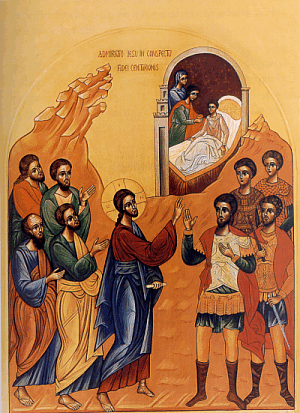Ut sanaret filium ejus

Passing On the Tradition
One of the best things about being a very small monastic household is the freedom to make use of the opportunities for passing on the tradition that present themselves in the course of our prayer and our work. This morning, for example, I was able to say a few words about the significance of today’s Benedictus Antiphon, right after we sang it at Lauds. Given that we have daily Mass in the Extraordinary Form, today is the 20th Sunday After Pentecost, and the Gospel is John 4:46-53. The Benedictus Antiphon is drawn from it.
He came again therefore into Cana of Galilee, where he made the water wine. And there was a certain ruler, whose son was sick at Capharnaum.
He having heard that Jesus was come from Judea into Galilee, sent to him and prayed him to come down and heal his son: for he was at the point of death.
Jesus therefore said to him: Unless you see signs and wonders, you believe not.
The ruler saith to him: Lord, come down before that my son die.
Jesus saith to him: Go thy way. Thy son liveth. The man believed the word which Jesus said to him and went his way.
And as he was going down, his servants met him: and they brought word, saying, that his son lived.
He asked therefore of them the hour wherein he grew better. And they said to him: Yesterday at the seventh hour, the fever left him.
The father therefore knew that it was at the same hour that Jesus said to him: Thy son liveth. And himself believed, and his whole house.
Benedictus Antiphon
Antiphonale Monasticum, p. 611.
Erat quidam regulus
cuius filius infirmabatur Capharnaum.
Hic cum audisset, quod Iesus veniret in Galilaeam,
rogabat eum, ut sanaret filium ejus.
The Name of Jesus
The musical summit of the antiphon is over the Most Holy Name of Jesus: The Lord God saves, the Lord God heals, the Lord God makes whole. Everything, then, in the antiphon moves upward to the Name of Jesus or flows therefrom.
Place and Time
The words Capharnaum, and Galilaeam even more so, are given a rich musical treatment, suggesting the importance of place in the economy of the Incarnation. Jesus, our Saving God, is not indifferent to what some would dismiss as mere mundane considerations: place and time. The wonder of the Incarnation lies, precisely, in this: that our God comes to meet each of us in a given place, one that can be circumscribed geographically and pinpointed on a map; at a given moment in time. This given moment on the calendars and clocks of our chronos becomes the moment of the Divine Inbreaking, God’s moment, His kairos.
The Magnificat Antiphon
Antiphonale Monasticum, p. 612.
The ruler intercedes with Jesus for his sick son: rogabat eum, ut sanaret filium eius. Only at the Magnificat Antiphon of Second Vespers do we hear the wondrous outcome of the ruler’s supplication. “The father therefore knew that it was at the same hour that Jesus said to him: Thy son liveth. And himself believed, and his whole house.” Again, the Name of Jesus is given a musical treatment that makes it the heart and centre of the whole antiphon.
The Sacramental Quality of Neums
I explained to my brothers this morning that every neum has a “sacramental” quality. It is, as Saint Gertrude the Great experienced, a vehicle of grace both for the one who sings it and the one who hears it. Inspired by the Holy Ghost, the Church clothes the Word of God in the sacred vesture of her chant. Like a garment that emphasizes and prolongs the movement of a dancer’s body, so does the chant emphasize and prolong the movement of the Word in medio ecclesiae.

“Inspired by the Holy Ghost, the Church clothes the Word of God in the sacred vesture of her chant. Like a garment that emphasizes and prolongs the movement of a dancer’s body, so does the chant emphasize and prolong the movement of the Word in medio ecclesiae.”
>> I liked this phrase a lot and quoted it on my site. Yours, ACC (the Netherlands)